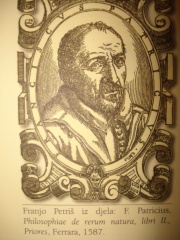

The Most Famous
PHILOSOPHERS from Croatia
This page contains a list of the greatest Croatian Philosophers. The pantheon dataset contains 1,267 Philosophers, 2 of which were born in Croatia. This makes Croatia the birth place of the 53rd most number of Philosophers behind Cyprus, and Lithuania.
Top 2
The following people are considered by Pantheon to be the most legendary Croatian Philosophers of all time. This list of famous Croatian Philosophers is sorted by HPI (Historical Popularity Index), a metric that aggregates information on a biography's online popularity.

1. Franciscus Patricius (1529 - 1597)
With an HPI of 68.66, Franciscus Patricius is the most famous Croatian Philosopher. His biography has been translated into 30 different languages on wikipedia.
Franciscus Patricius (Croatian: Franjo Petriš or Frane Petrić; Italian: Francesco Patrizi; 25 April 1529 – 6 February 1597) was a philosopher and scientist from the Republic of Venice, originating from Cres. He was known as a defender of Platonism and an opponent of Aristotelianism. His national origin differs in sources, and he is described both as Croatian and as Italian. In Croatia he is mostly referred to as Franjo Petriš or Frane Petrić (sometimes Petris, Petrišević and Petričević). His family name in Cres was known as Petris. Patricius initially dedicated his studies to Aristotelian Philosophy at the University of Padua, but turned to Platonism while still a student. He became a sharp, high-profile opponent of Aristotelianism, with whom he grappled extensively in extensive writings. After many years of unsuccessful efforts to secure material livelihood, he finally received an invitation in 1577 to the Ducal Court of House of Este in the Duchy of Ferrara. At the University of Ferrara, a chair for Platonic philosophy was set up especially for him. In the years that followed, he gained a reputation as a professor, but was also involved in scientific and literary controversy; he tended to polemic and was in turn violently attacked by opponents. In 1592 he accepted an invitation to Rome, where thanks to papal favor a new chair was created for him. The last years of his life, were embroiled in a serious conflict with the Roman Inquisition, which banned his main work, the Nova de universis philosophia. As one of the last Renaissance humanists, Patricius was characterized by extensive education, varied scientific activity, a strong will to innovate and exceptional literary fertility. He critically examined established, universally recognized teachings and suggested alternatives. In particular, he wanted to replace the prevailing Aristotelian natural philosophy with his own model. He opposed the traditional view of the meaning of historical studies, which was usually restricted to moral instruction, with his concept of a broad, neutral, scientific historical research. In Poetry he emphasized the importance of Inspiration and fought against conventional rules, which he considered to be arbitrary, unrealistic restrictions on creative freedom. In the Early Modern Period, Patricius's strongly controversial philosophy of nature found considerable echo despite the church's condemnation, but remained an outsider position. Modern research recognizes his contributions to the constitution of modern concept of space and to historical theory.

2. Herman of Carinthia (1100 - 1160)
With an HPI of 63.10, Herman of Carinthia is the 2nd most famous Croatian Philosopher. His biography has been translated into 20 different languages.
Herman of Carinthia (1105/1110 – after 1154), also called Hermanus Dalmata or Sclavus Dalmata, Secundus, by his own words born in the "heart of Istria", was a philosopher, astronomer, astrologer, mathematician and translator of Arabic works into Latin. Alongside Adelard of Bath, John of Seville, Gerard of Cremona and Plato of Tivoli, Herman is the most important translator of Arabic astronomical works in 12th century. The influence of his translations on the development of medieval European astronomy was especially large.
People
Pantheon has 2 people classified as Croatian philosophers born between 1100 and 1529. Of these 2, none of them are still alive today. The most famous deceased Croatian philosophers include Franciscus Patricius, and Herman of Carinthia.

